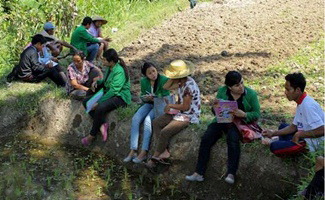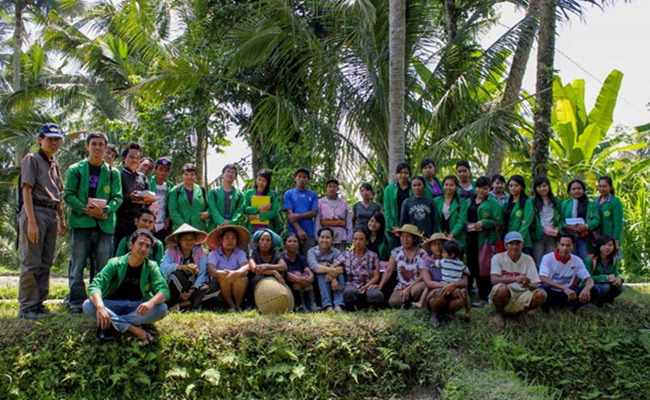The PEER research team produced learning modules, several undergraduate action research proposal projects, and 3,000 copies of student books. The PI held three workshops with 120 teachers and undergraduates to evaluate the student books’ effectiveness as an educational resource and discuss methods of adding it to the existing curriculum, and gave a presentation to the Environmental Education Center Bali on methods to integrate subak culture into school curriculums.
Kuliah Kerja Nyata (KKN) or Students Field Work is one of the three pillars of higher education in Bali. As a direct result of the PEER project, approximately 1,800 community members, youth groups, teachers, and students participated in the community service outreach over the course of 35 days in a fully immersive Subak cultural experience focused on heritage and sustainability, the first in KKN history. Participants trained on how to teach primary school students sustainability based on their environment and shared heritage.
The project was presented by the PI at the Asia Engage Conference. A second edition of the student book will be produced and printed by the Deputy of Cultural Affairs to be used as a resource for primary and secondary school students in Indonesia. The research team also received several grants from the Indonesian Ministry of Technology, Research, and Higher Education.
PublicationsSurata, S.P.K., I.G.A.G.S. Jayantini, J.S. Lansing. 2015. Engaging Student Teachers in Designing Ecopedagogy Learning Modules for Bali’s Subak Cultural Landscape.
NACTA Journal 59(2): 139-143 (June 2015).
https://www.jstor.org/stable/10.2307/nactajournal.59.2.139Surata, S.P.K., I.G.A.G.S. Jayantini, and J.S. Lansing. 2014. Exploring Community Capital of the Balinese Subak Cultural Heritage: A Content Analysis of Participatory Maps.
International Journal of Technical Research and Applications 2(7): 28/34
. e-ISSN: 2320-8163
Surata, S.P.K., N.G.A.G.E Martiningsih, and I.G.A.G.S. Jayantini. 2014. Participatory Mapping: Developing Collaborative Learning for Educating Youth to Understanding Their Cultural Landscape Heritage.
Proceedings of the 2nd Asia Engage Regional Conference, Bali, 17-20 November 2014.
Surata, S.P.K. et al. 2013. “Ngayah” Pelibatan Mahasiswa Calon Guru dalam Ipteks bagi Wilayah berbasis Pendidikan untuk Pembangunan Berkelanjutan dan Pariwisata Budaya. (Involving The Student Teachers in an Education for Sustainable and Cultural Tourism based Science and Technology for a Region Application) Aplikasi Ipteks, 4(1): 84-100 (Ngayah, A Journal of Science and Technology Application).





